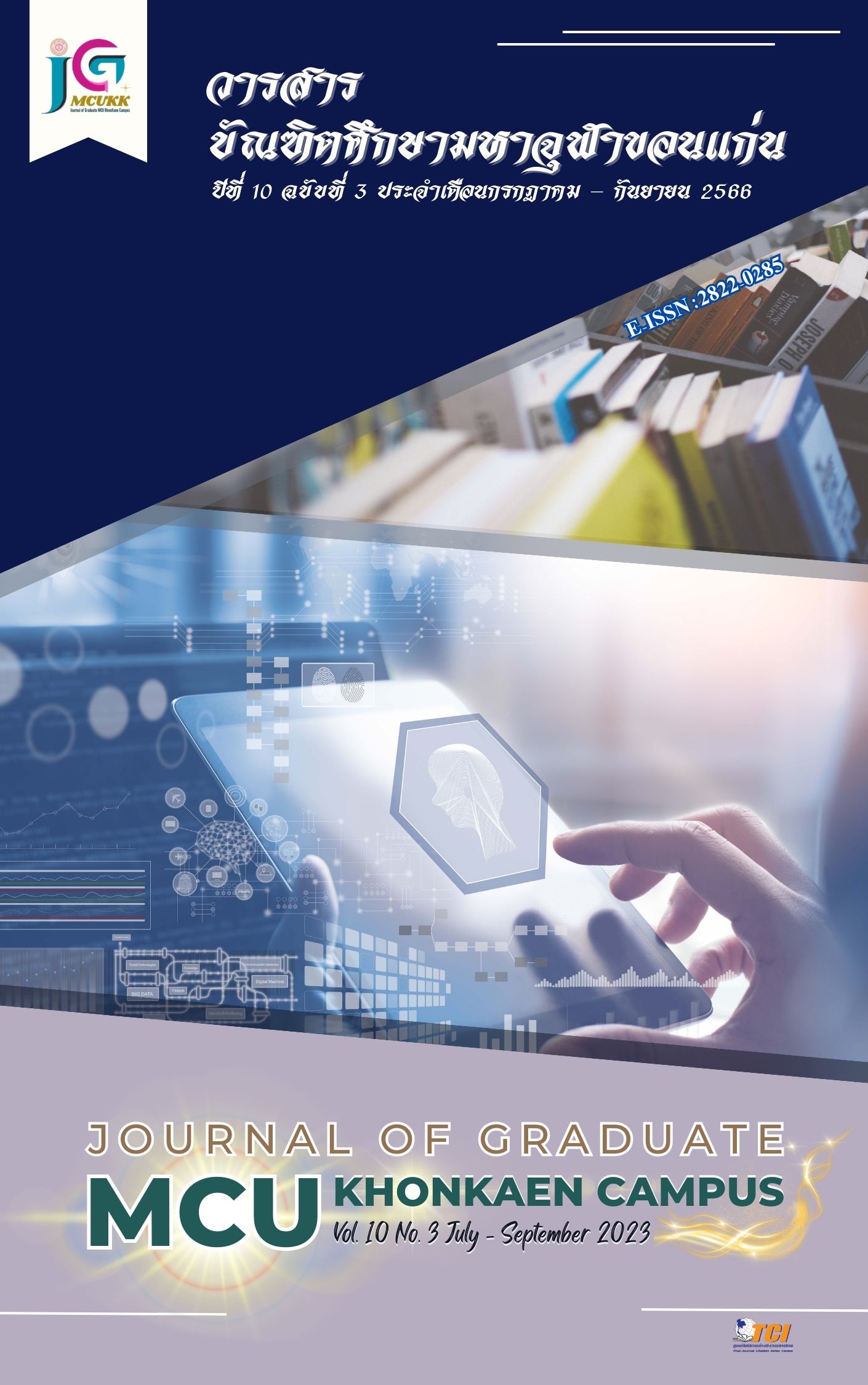การบูรณาการหลักพุทธธรรมในการบริหารวิชาการสู่ความเป็นเลิศ
Main Article Content
บทคัดย่อ
การบริหารวิชาการสู่ความเป็นเลิศตามแนวพระพุทธศาสนา โดยการพัฒนาหลักสูตรเป็นสิ่งสำคัญของการจัดการศึกษา การจัดการเรียนการสอนให้บรรลุจุดมุ่งหมายที่กำหนดไว้ การจัดระบบของความรู้หรือข้อมูลและเหตุการณ์เรียนรู้ที่ซับซ้อน โดยใช้สื่อการเรียนการสอน เป็นสิ่งที่ช่วยในการเรียนรู้ซึ่งครู และนักเรียนเป็นผู้ใช้ เพื่อช่วยให้การเรียนการสอนมีประสิทธิภาพในการเลือกสื่อการเรียนการสอน มีนักเรียนเป็นศูนย์กลางในการเรียนการสอน ให้นักเรียนมีแนวคิดความเป็นของตัวเอง กล้าแสดงออกทางความคิด ทางร่างกาย และจิตใจ มีความเป็นภาวะผู้นำในการร่วมทำกิจกรรม เพื่อส่งเสริมให้นักเรียนมีความสามัคคีกันมีความรับผิดชอบต่อหน้าที่ว่าตัวเองเป็นนักเรียน มีการวัดผลและประเมินผลเป็นกิจกรรมทางวิชาการที่สำคัญยิ่งที่จะทำให้ทราบว่าการดำเนินการจัดกิจกรรมการเรียนการสอนตามความมุ่งหมายของหลักสูตรหลักพุทธธรรมในการบริหารวิชาการสู่ความเป็นเลิศ คือ หลักอิทธิบาท 4 เป็นหลักธรรมที่นำไปสู่ความสำเร็จในการบริหารวิชาการสู่ความเป็นเลิศโดยบูรณาการกับหลักสูตรการเรียนการสอน สื่อการเรียนการสอนและการวัดผลและประเมินผลบูรณาการหลักพุทธธรรมในการบริหารวิซาการสู่ความเป็นเลิศ ด้านหลักสูตรสามารถบูรณาการด้วยการพิจารณาหลักสูตรให้มีความสอดคล้องกับหลักสูตรแกนกลางสอดคล้องกับความสามารถของ
ผู้เรียน ภูมิปัญญาท้องถิ่น ด้านการเรียนการสอน สามารถบูรณาการด้วย การเน้นผู้เรียนเป็นศูนย์กลางมากขึ้นกระตุ้นให้ผู้เรียนเกิดการคิดวิเคราะห์และลงมือปฏิบัติด้วยเอง ด้านสื่อการเรียนการสอนด้วยการประยุกต์สื่อการเรียนการสอนให้ทันสมัยจากเทศนโลยีมากขึ้นและร่วมมือกันผลิตสื่อการเรียนการสอนท้องถิ่นมากขึ้น และด้านกรวัดผลและประเมินผล สามารถบูรณาการด้วยการพิจารณาเกณฑ์การวัดและประเมินผลให้ชัดเจนมากขึ้นเพื่อพัฒนาการบริหารวิชาการของโรงเรียนให้ดีขึ้น
Article Details

อนุญาตภายใต้เงื่อนไข Creative Commons Attribution-NonCommercial-NoDerivatives 4.0 International License.
เอกสารอ้างอิง
ดวงเดือน พันธุมนาวิน และ เพ็ญแข ประจนปจจนึก. 2520. จริยธรรมของเยาวชนไทย. (พิมพ์ครั้งที่ 2). กรุงเทพฯ: สถาบันวิจัยพฤติกรรมศาสตร์ มหาวิทยาลัยศรีนครินทรวิโรฒประสานมิตร.
ปิ่น มุทุกกันต์. (2508). มงคลชีวิตภาค 2. กรุงเทพฯ: คลังวิทยา.
พระธรรมโกศจารย์ (ประยูร ธมุมจิตฺโต). (2549). พุทธวิธีบริหาร. กรุงเทพฯ: มหาจุฬาลงกรณราชวิทยาลัย.
พระธรรมโกศจารย์ (ประยูร ธมฺมจิตฺโต). (2553). ทำอย่างไรจึงจะเรียนเก่ง. กรุงเทพฯ: มหาจุฬาลงกรณราชวิทยาลัย.
พระธรรมโกศาจารย์ (ประยูร ธมฺมจิตฺโต). (20 มิถุนายน 2553). ธรรมในใจของนักบริหารไฮโซ. ไทยรัฐ, น. 24.
พระธรรมโกศาจารย์ (พุทธทาสภิกขุ). (2549). การงานที่เป็นสุข. กรุงเทพฯ: ธรรมสภา.
พระธรรมปิฎก (ป.อ.ปยุตโต). (2543). ธรรมะกับการทำงาน. (พิมพ์ครั้งที่ 3). กรุงเทพฯ: มูลนิธิพุทธรรม.
พระธรรมปิฎก (ป.อ.ปยุตฺโต). (2543). พุทธธรรม ฉบับปรับปรุงและขยายความ. (พิมพ์ครั้งที่ 9). กรุงเทพฯ: มหาจุฬาลงกรณราชวิทยาลัย.
พระพรหมคุณาภรณ์ (ป.อ.ปยุตฺโต). (2549). การเพิ่มประสิทธิภาพในการทำงาน. (พิมพ์ครั้งที่ 4). กรุงเทพฯ: สุขภาพใจ.
พระมหาณรงณ์ศักดิ์ ฐิติญาโณ. (2546). พระอภิธรรมปิฎก. กรุงเทพฯ: มหาจุฬาลงกรณราชวิทยาลัย.
พระมหาวุฒิชัย วชิรมธี (ว.ชิรเมธี). (2550). คนสำราญงานสำเร็จ. (พิมพ์ครั้งที่ 3). กรุงเทพฯ: บริษัท อมรินทร์พริ้นติ้งแอนต์พลับลิขซึ่ง จำกัด (มหาชน).
พระสุธวรญาณ (ณรงค์ จิตฺตโสภโณ). (2552). คู่มือปฏิบัติธรมวันพระและวันอาทิตย์ (วัตมหาพฤฒาราม). กรุงเทพฯ: บริษัท เอพ พริ้นท์แอนต์แพ็ค จำกัด.
พุทธทาสภิกขุ. (2537). การงานที่เป็นสุข. กรุงเทพฯ: ธรรมสภา.
ราชบัณฑิตสถาน. (2556). พจนานุกรมฉบับราชบัณฑิตยสถาน พุทธศักราช 2542. กรุงเทพฯ: นานมีบุ๊คส์ พับลิชเคชั่นส์.
ราชบัณฑิตสถาน. (2546). พจนานุกรมฉบับราชบัณฑิตยสถาน พุทธศักราช 2592. กรุงเทพฯ: นานมีบุ๊คส์ พับลิชเคชั่นส์.
วรภัทร์ ภู่เจริญ. (2546). ธรรมะเพื่อการเพิ่มผลผลิต (ตอนที่ 2). Productivity World วารสารเพื่อการเพิ่มผลผลิต, 8-4.
วีระพงศ์ ถิ่นแสนดี. (2550). การพัฒนาคุณธรรมจริยธรรมนักเรียนสิงห์สะอาด อำเภอสหัสขันธ์ จังหวัดกาฬสินธุ์. (วิทยานิพนธ์ปริญญาครุศาสตรมหาบัณฑิต). มหาสารคาม: มหาวิทยาลัยราชภัฏมหาสารคาม.
สมพร เทพสิทธา. (2533). พุทธศาสนาชีวิตประจำวัน. กรุงเทพฯ: โอเตียนสโตร์.
Wagner, J.A, & Hollembeek. J.R. (1995). Management of organization behavior. New Jersey: Prentice - Hall, p.74.

